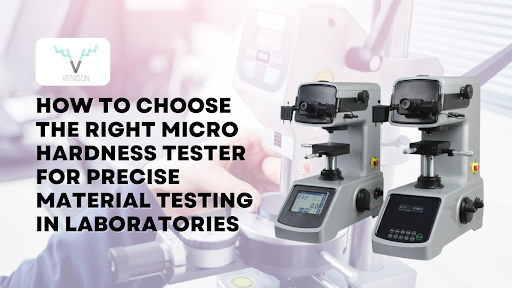Choosing the right micro hardness tester for your lab is crucial to ensuring accurate and reliable results. Whether you’re testing metals, ceramics, or thin coatings, the right equipment matters.
But with so many options available, how do you decide? Let’s explore the key factors to consider when selecting a micro hardness tester, and how it can meet the precise needs of your laboratory.
Understanding Micro Hardness Testing
Before diving into the selection process, it’s important to know what micro hardness testing is. This method evaluates a material’s hardness on a microscopic scale, typically focusing on small or thin samples. It’s perfect for materials like coatings or metals that require detailed analysis.
There are several types of tests, but the Vickers micro hardness tester is one of the most common. This tester uses a diamond indenter to apply force to the material’s surface, creating an indentation that helps measure hardness. If you’re considering a micro Vickers hardness tester, you’re already on the right track for materials requiring fine, detailed results.
Key Factors to Consider When Choosing a Micro Hardness Tester
Now that you understand the basics, what should you look for in a micro hardness tester? Here are some key factors to keep in mind.
1. Application and Material Type
What materials will you be testing? Different materials require different testing methods. For example, metals and alloys often require the Vickers micro hardness test, which provides detailed readings with a higher load capacity. If you’re working with softer materials, you might need a tester that can adjust its force.
In addition, if your lab frequently tests thin films or coatings, you’ll want a machine capable of handling smaller, delicate samples. Not all testers are equipped for this, so consider the specific materials you work with most often.
2. Load Capacity and Accuracy
Micro hardness testers come with different load capacities. For detailed testing, you need a machine with the right range. The micro Vickers hardness tester, for example, offers various load options. A typical load range for these testers could be from 10g to 1kg, depending on your testing needs.
Accuracy is another factor. Look for machines that are known for reliable results, especially if your lab requires precise measurements. Some digital micro hardness testers also feature software that calculates results automatically, reducing human error.
3. Ease of Use and User Interface
You want a micro hardness tester that’s easy to use. A complicated interface can slow down your workflow and increase the chance of errors. Many modern testers, such as digital ones, offer touchscreens and intuitive software. This makes setup faster and more efficient.
Does your lab have multiple users? If so, choose a model with customizable settings and user profiles. This ensures everyone can work effectively without needing to reconfigure the machine constantly.
4. Price and Budget
Price is always a factor. Micro hardness tester prices can vary widely, depending on the features, load capacity, and level of automation. Basic models are more affordable but may lack advanced features that some labs require. On the other hand, fully automated models with integrated software tend to come at a higher cost.
It’s essential to balance your budget with your lab’s needs. Don’t just go for the cheapest option; instead, choose a tester that provides the necessary functions for your specific applications. High-end machines may save time in the long run due to their efficiency and accuracy.
5. Test Method: Vickers or Knoop?
Two of the most common micro hardness testing methods are Vickers and Knoop. Vickers is more versatile and used for a wide range of materials. It’s ideal if you’re testing metals, ceramics, or composites.
The Knoop test is typically used for very brittle materials or thin coatings. It produces a longer indentation, making it more suitable for fragile samples.
When choosing your micro hardness tester, determine which method will suit your typical testing needs. For most labs, a Vickers micro hardness tester will provide the flexibility needed for various applications.
6. Maintenance and Support
How easy is the tester to maintain? Regular calibration is essential for ensuring consistent results. Some machines require more frequent calibration, so it’s crucial to factor this into your decision.
Also, consider the availability of customer support. Choosing a supplier that provides good technical support and calibration services can make a significant difference in the long run.
Why Micro Hardness Testing Is Important for Laboratories
Micro hardness testing provides the level of detail many industries require today. Whether you’re conducting research or performing quality control, these machines offer precision that’s difficult to achieve with other methods.
For laboratories that handle material testing regularly, investing in the right micro hardness tester is invaluable. You’ll not only enhance your lab’s capabilities but also improve the reliability of your data. Micro hardness tests help determine whether materials meet the necessary standards for use, especially in critical industries like aerospace, automotive, and medical devices.
Comparing Micro Hardness Tester Prices
As mentioned earlier, prices can vary greatly depending on the model and features. Basic micro hardness testers may start at a few thousand dollars, while advanced digital models can reach tens of thousands. Keep in mind that higher-end models often include automatic calibration, software integration, and multiple testing methods.
While it’s tempting to focus on the initial cost, think about long-term value. A more expensive machine could save you time and reduce errors, leading to greater productivity.
How to Ensure You Make the Right Choice
When choosing the right tester, don’t just focus on technical specifications. Consider how the tester fits into your overall workflow. Will it make your team’s job easier? Can it handle the volume and type of samples you work with regularly? What about future needs?
If you’re still unsure, consult with experts who specialize in micro hardness testers. They can provide insight into what models best suit your lab’s unique requirements.
Ready to Invest in a Micro Hardness Tester?
Choosing the perfect micro hardness tester is a decision that should align with your lab’s needs, materials, and budget. If you’re looking for a reliable, precise machine that will help you deliver top-quality results, consider exploring the full range of products available at Qualitest North America.
At Qualitest, you’ll find high-performance micro hardness tester and more, all designed to provide the accuracy your lab demands. Visit our site today to learn more and get the best equipment for your material testing needs.












